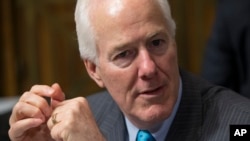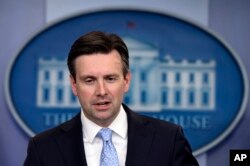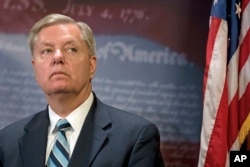One day before President Barack Obama is to arrive in Saudi Arabia, U.S. senators of both parties indicated varying levels of support for legislation that has infuriated Riyadh and drawn criticism from the White House.
The Justice Against Sponsors of Terrorism Act would make it easier for families of the victims of the September 11, 2001 attacks to sue foreign governments deemed to have aided al-Qaida. Although the bill’s language singles out no individual country and could be applied to any terrorist group, it is widely seen as targeting Saudi Arabia, the nation of origin of many 9/11 plotters.
“We should use every means available to prevent the funding of terrorism. And the victims of terrorism in our country should be able to seek justice,” said Republican Senator John Cornyn of Texas, who wrote the bill with New York Democrat Chuck Schumer.
“It is my hope that this legislation will serve as an effective deterrent and make foreign governments think twice before sending money to terrorist groups who target our homeland,” Cornyn added in a floor speech Tuesday.
The White House is warning of unintended consequences, saying the bill undermines an international legal norm that has benefited the United States on the world stage.
“The whole notion of sovereign immunity is at stake. And it is one that has more significant consequences for the United States than any other country,” White House Press Secretary Josh Earnest said Monday.
Saudi Arabia has long denied any role in the 9/11 attacks. Last week, The New York Times quoted Saudi officials as saying they would sell off hundreds of billions of dollars in U.S. assets if the Cornyn-Schumer bill becomes law.
The legislation was approved in committee earlier this year and could be taken up by the full Senate at any moment. For now, even some of the president’s most loyal Democratic lieutenants in the chamber are on record supporting the bill or say they are inclined to do so.
“I would lean in favor of it, but I’m going to read the 28 pages before I make a definitive decision,” Democratic Senator Barbara Boxer of California told VOA.
The “28 pages” refers to a classified portion of a congressional report on the 9/11 attacks widely believed to have delved into possible ties between Saudi elements and the hijackers who in 2001 committed the deadliest terrorist attack on U.S. soil.
Boxer indicated she is not swayed by the White House’s opposition to the bill.
“I’m not the president of the United States. I’m a member of the Senate, and my job is to look out for the rights of the people of this country,” she said.
In an unusual twist, one of Obama’s toughest foreign policy critics said – in this case – the White House’s concerns are valid.
“Groups that we see as terrorists, other countries see as allies,” Republican Senator Lindsey Graham told VOA.
Graham said the bill must make clear that only direct backing for terror operations – not generalized support for a terrorist group – can be the subject of a civil lawsuit in U.S. courts. If the legislation’s language is too broad, international protections the United States enjoys could be eroded.
“We want to make sure this thing [the bill] is as tight as it can be,” the senator said. “During Bosnia, we hit the Chinese embassy. We hit a Doctors Without Borders hospital [in Afghanistan]. We don’t want to put our soldiers and our diplomats at risk by setting a precedent that could come back to haunt us.”
Even so, Graham expressed confidence that the bill’s language can be clarified to alleviate his concerns and earn his support.
The legislation is one of many thorny topics likely to arise during Obama’s trip to Saudi Arabia.
“The Saudis see the administration’s engagement with Iran as a threat to them,” said Democratic Senator Robert Menendez of New Jersey, adding that, while the administration continues to call Saudi Arabia an important ally, “[U.S.] actions, they feel, belie those words.”
“The administration is going to be going into some difficult meetings. The president has a real challenge in assuring the Saudis that we are truly going to be a continuing ally,” Menendez said.






